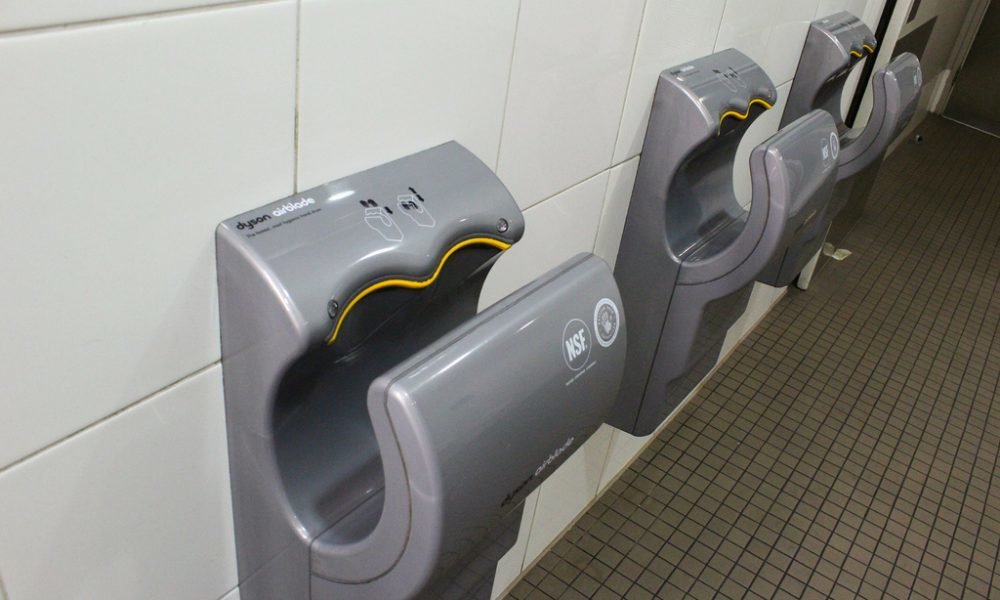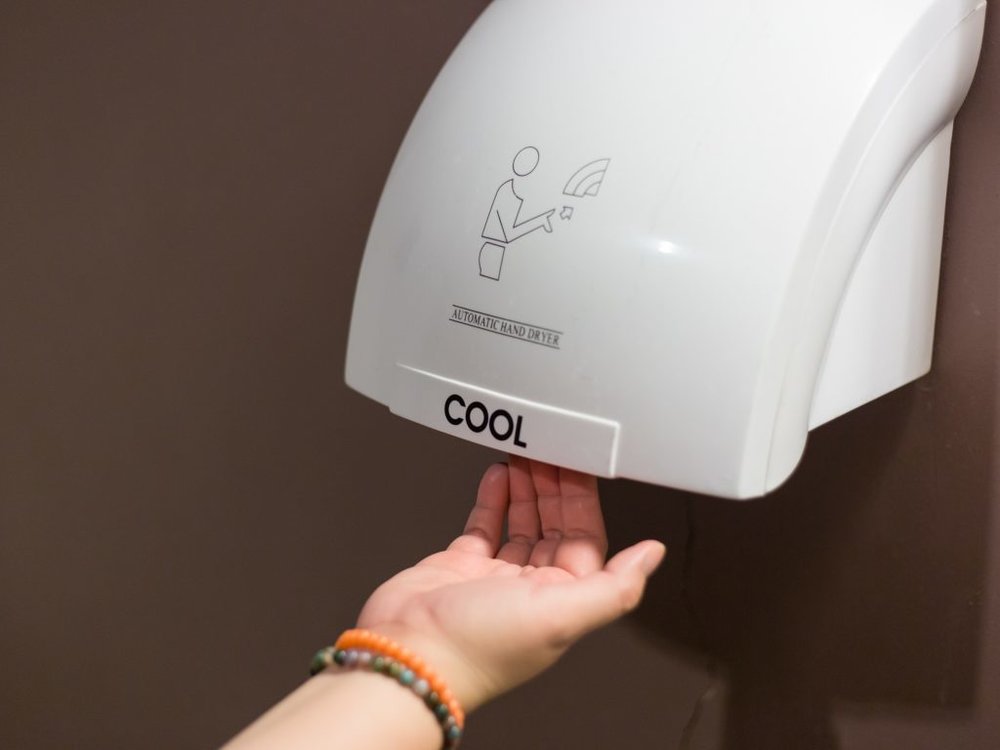
Warning: Hand Dryers in Public Bathrooms Can Be Extremely Unsanitary

We all knew that public bathrooms are pretty disgusting but you won’t believe where most of the disease-causing germs are hiding in these places. An article that went viral – literally and figuratively – in 2016 claimed that a public hand dryer can spread germs 1300 times faster than a conventional paper towel – so you’re better off leaving your hands undried after washing instead of sticking them into this bacterial launch machine.
Hand Dryers a Threat to Public Health

The use of hand dryers in places where hygiene is considered of utmost priority, such as hospitals and restaurants, can be even more dangerous due to the risk of cross-infection.
You’ll often see signs in public bathrooms prodding people into washing their hands after their potty breaks but few daring souls manage to dodge the societal pressure and spend only a few seconds cleaning their dirty mitts or skip the sink altogether. But before you think, “Eww, disgusting!” these guys are probably walking away with less germs on their hands than those who hit the hand dryers after a good scrubbing session.
Researchers are claiming that hand dryers that blow warm air are a huge threat for public health and safety since they can easily spread disease by launching bacteria and viruses into the air. This is particularly problematic since most of the airborne viruses are able to survive for longer periods of time than bacteria.
Comparison Between Hand Dryer and Paper Towels
A study conducted by researchers from University of Westminster compared the spread of viruses from paper towel to that of a hot hand dryer. Two people were asked to put on disposable gloves on their hands and smear the MS2 strain of virus, which isn’t infectious for humans, all over them.
The researchers wanted to replicate the same viral spread as from the feces of humans with dangerous stomach and intestinal infections. The amount of virus smeared on the participants’ hands was almost the same that would normally stick to someone’s hands after a potty break.
The participants were then asked to use either the paper towel or the air dryer to dry their hands and the air surrounding each of the two drying methods was captured into tiny agar disks filled with E.Coli – a bacterial strain that MS2 infects and destroys – to see the amount of virus that lurked in the air.
Paper Towels Win

In comparison to the paper towels, hand dryers were almost 1300 times worse in spreading germs
When the MS2 bacteria acted on the film of E-Coli in the petri dishes, it killed the bacteria, leaving a dark spot called plaque. At the end of the experiment, researchers simply counted the number of plaques in each dish to determine the amount of virus it contained. In comparison to the paper towels, hand dryers were much worse in spreading germs – almost 1300 times worse.
Researchers had captured the airborne virus near the dryer from several different distances and heights but the result was consistent across the chart: The jet hand-dryers like Dyson, which had much greater blowing strength than regular dryers, were 13,000 times more likely to spread viruses than the traditional paper towel alternative.
Children at Greater Risk of Infection
Moreover, researchers found out that the air sample taken from a child’s height contained more than 70 per cent of the viruses making children more vulnerable to contracting airborne infections from hand dryers. The paper towels, on the other hand, launched absolutely no viruses, making it the safest drying option for public restrooms.
The virus launched from the jet dryers also lingered in the air for a long period of time. When researchers captured air samples 15 minutes after drying hands, the jet dryer still contained 100 times more viruses than paper towels, and 50 times more than a traditional warm dryer.
Criticisms from Hand Dryer Manufacturers

Hand dryer companies like Dyson Airblade have criticized the alarming study, accusing the researchers of scaring the masses by using unrealistic circumstances where participants put their unwashed, gloved hands containing high amounts of virus through the dryer – which rarely happens in public bathrooms.
The researchers responded to the criticism explaining that the purpose of the study was simply to demonstrate the germ-spreading effects of hand dryers in comparison to paper towels. Previous research has already shown that most people don’t wash their hands as thoroughly as the standard guidelines suggest, meaning that some of the germs tend to remain in contact with the skin even after the hands are washed.
More in Motivation
-
`
Is Swimming in Cold Water Good for You?
Swimming is a beloved activity that provides numerous physical and mental health benefits. Swimming can be a fantastic workout, whether you’re...
November 15, 2023 -
`
Unlocking the True Benefits of Detox Water
Detox water has taken the health and wellness world by storm, promising a wide range of benefits that go beyond ordinary...
November 7, 2023 -
`
How Tom Brady Shed 10 lbs After Retirement
One of the NFL’s most celebrated athletes, Tom Brady, has always been a topic of discussion. Brady never fails to surprise,...
November 1, 2023 -
`
AI’s Hidden Toll on Our Brains
Artificial Intelligence (AI) has permeated almost every facet of our lives, from virtual assistants and recommendation algorithms to autonomous vehicles and...
October 24, 2023 -
`
What to Drink During a Workout
When it comes to getting the most out of your workout, proper hydration is key. What you drink during exercise can...
October 17, 2023 -
`
Wearable Technology Applications in Healthcare
The world of healthcare is evolving at an unprecedented pace, and wearable technology is one of the driving forces behind this...
October 10, 2023 -
`
Initiating and Integrating Exercise in Daily Life
Incorporating exercise into our daily lives is essential for maintaining optimal health and well-being. However, initiating a fitness routine and seamlessly...
October 10, 2023 -
`
Jason Momoa’s Workout Routine for Iconic Aquaman Look
We all remember the moment: The big screen lights up, waves crash, and out emerges Jason Momoa as Aquaman, with his...
October 8, 2023 -
`
Crying: The Benefits on Mental Health
In a world that often champions stoicism and emotional restraint, shedding tears is sometimes dismissed as a sign of vulnerability. However,...
September 26, 2023















You must be logged in to post a comment Login